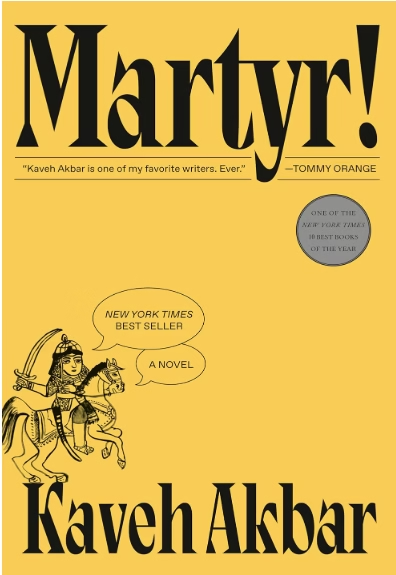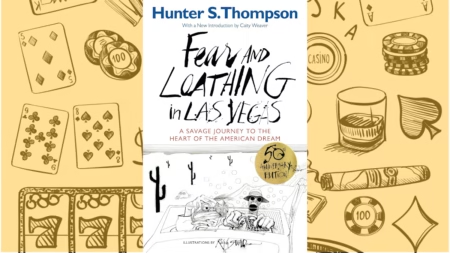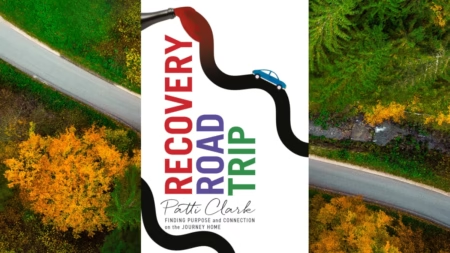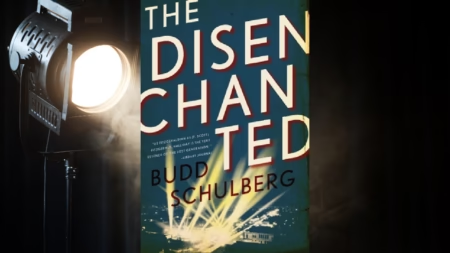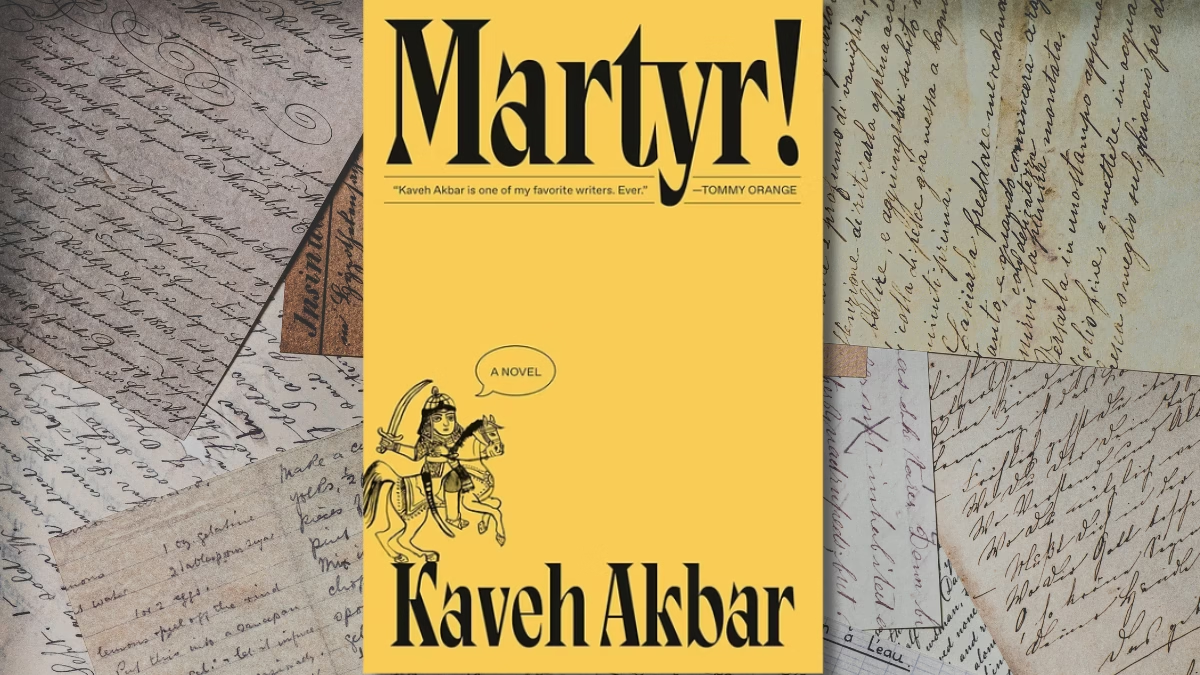
Kaveh Akbar’s “Martyr!” is a bold, emotional novel that wrestles with loss, purpose, addiction, identity and the hard work of becoming a writer. It doesn’t follow a simple plot. Instead, it moves in pieces and layers, showing how a man haunted by grief and addiction tries to build meaning from the wreckage of his life.
The central character is Cyrus Shams, an Iranian American poet in his late twenties. He’s a recovering addict who often feels unmoored. He lost his mother when he was a baby — she died in a tragic plane incident — and his father also passed away, leaving Cyrus with deep questions about life, death and what remains when everything falls apart.
In the present time of the novel, Cyrus is trying to make something of himself. He dreams of writing a grand work — The Book of Martyrs — about people who died for something meaningful. He becomes drawn to Orkideh, a terminally ill artist who is staging her final days inside a museum exhibit, speaking with visitors. Cyrus believes meeting her might guide him toward some understanding of martyrdom, art and purpose.
Along the way, the novel includes dreamlike dialogues, shifting points of view (from Cyrus, his mother in flashback, his father, others), and poetic fragments. It’s as much about feelings, questions and language as it is about “what happens next.”
One of the novel’s biggest strengths is its poetic language. Because Akbar is a poet by trade, his prose often reads like music. Lines and images linger. He doesn’t hide his ambition: he wants words to carry weight.
Another strength is its emotional honesty. Cyrus’s struggle with addiction and sobriety is not romanticized. The novel shows how hard it is to stay sober. How guilt, longing, emptiness and grief can press in. He sometimes thinks he had purpose when he was using — because the addiction brought direction (even if destructive).
The way Akbar weaves in memory, dream, myth and cultural identity (Persian and American) adds richness. It’s not a flat story. His use of shifting narration lets us see different angles: what Cyrus’s mother might have felt or how his father’s legacy echoes.
At multiple points, Cyrus teeters between sobriety and wanting to return to substances. One reviewer describes how Cyrus “sinks again and again into the … ups and downs” of drugs and alcohol, even as he fights for meaning. Bossy Bookworm+2The Blue Route+2
In moments when he is sober, Cyrus sees the world with an eagle’s eye — and sometimes it’s too raw, too painful. He feels naked, real, unshielded. In contrast, the moments when he’s stoned or drunk hide parts of the world. That tension — the clarity vs. the escape — is central to many scenes. (This mirrors similar moments in “John Barleycorn” or “Requiem for a Dream,” though in “Martyr!” it’s filtered through poetic longing.)
When Cyrus finally begins his conversations with Orkideh in her museum installation, there’s a mixture of hope and dread. He wants someone whose death is knowingly final to help clarify life. Their exchanges are fragile, loaded and sometimes dashed by sickness. This is a turning point: he is trying to confront death, and by extension, his own self-destructive urges.
In moments when Cyrus imagines or recalls his mother, we glimpse how absence shaped him. His desire for martyrdom is not only intellectual — it is a reaction to a life defined by absence and silence. The past is never quiet in this novel.
One drawback is the changing narrators and the shifting between dream sequences. At certain points, Cyrus becomes a quieter presence in his own story. With so many voices and shifts, some readers may feel less emotionally connected to him than to other characters or to the writing itself.
“Martyr!” is not an easy or light read — but it’s a moving one. It asks big questions: What makes a life meaningful? How do we confront death, grief and the void? Can art and language bridge emptiness? Cyrus is not a hero in the classic sense; he’s a person bruised by life, trying to build something out of brokenness.
If you read it, don’t expect tidy closure. The ending is ambiguous. You’ll leave with more questions than answers. But you might also feel changed or at least unsettled in a way that matters. The book doesn’t promise healing; it only offers an honest reckoning.
For a reader who doesn’t shy away from pain, who wants a book that feels alive to existential possibility and sorrow both, “Martyr!” is a daring debut. Kaveh Akbar proves he can move between poetry and fiction — and that his voice, when pushing against silence, can be unforgettable.
Addiction Fiction Sobees Score: 4 out of 5


TSC LIBRARY: Welcome to The Sober Curator Library! We don’t just read books; we immerse ourselves in literary journeys, tune in on Audible, and craft insightful reviews. Our digital shelves are organized into four genres: #QUITLIT, Addiction Fiction, Self-Help, and NA Recipe Books.
Your Go-To Guide for All Things Recovery & Sober Living

The Sober Curator’s PILLAR Content Hub is your one-stop guide for sobriety resources, addiction recovery resources, and sober living tips. From non-alcoholic drink guides to sober travel, entertainment, and lifestyle inspiration, our curated cornerstone articles are regularly updated to keep you informed, inspired, and connected. Whether you’re in recovery, sober curious, or supporting someone you love, this hub offers the sober lifestyle guide you’ve been looking for.

Resources Are Available
If you or someone you know is experiencing difficulties surrounding alcoholism, addiction, or mental illness, please reach out and ask for help. People everywhere can and want to help; you just have to know where to look. And continue to look until you find what works for you. Click here for a list of regional and national resources.




